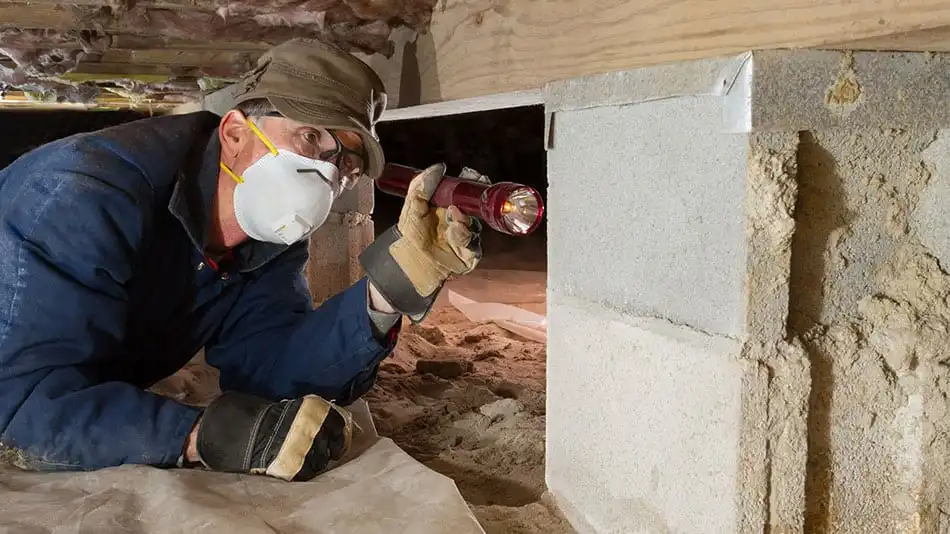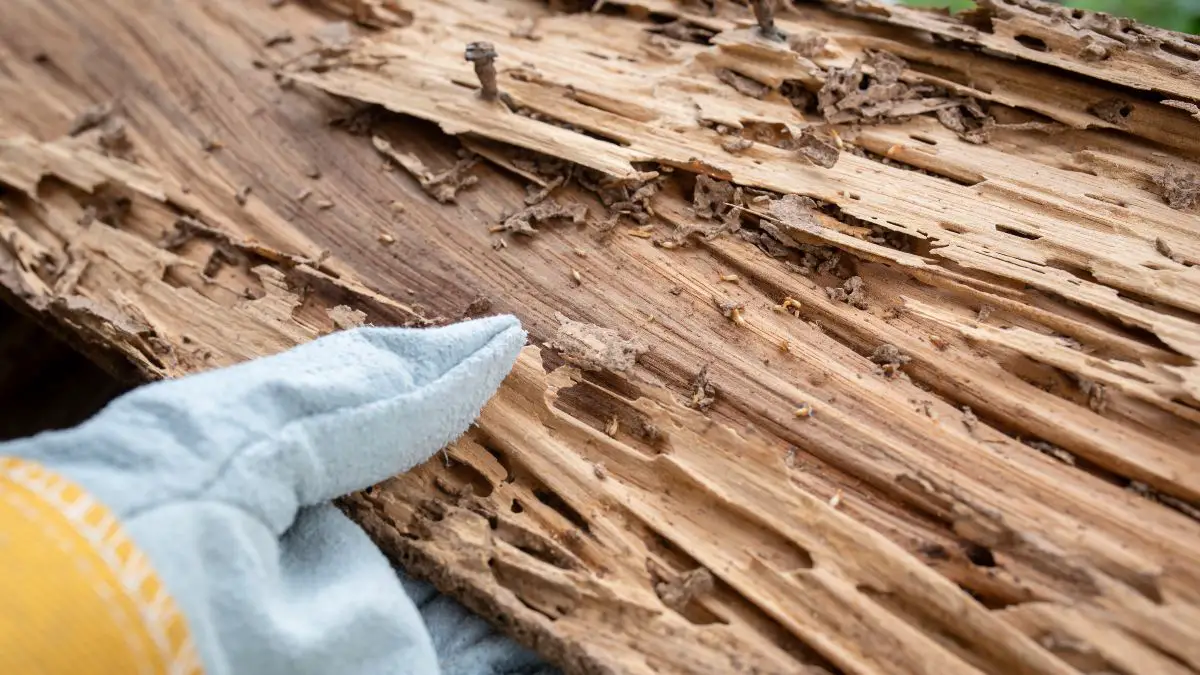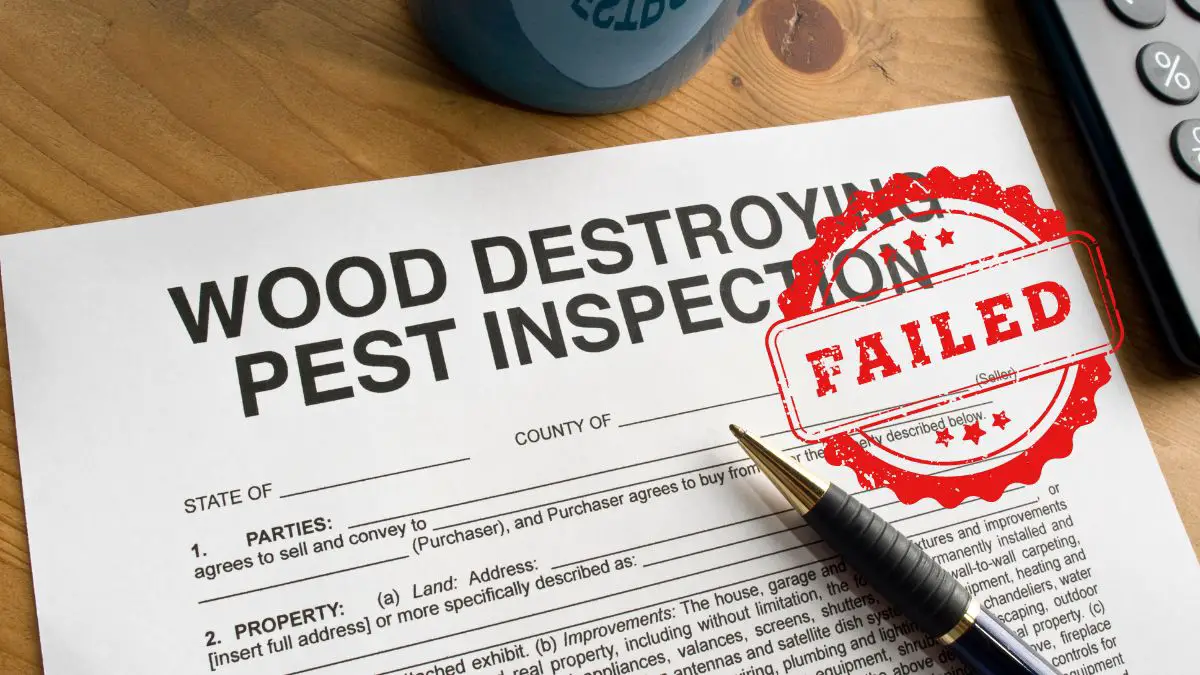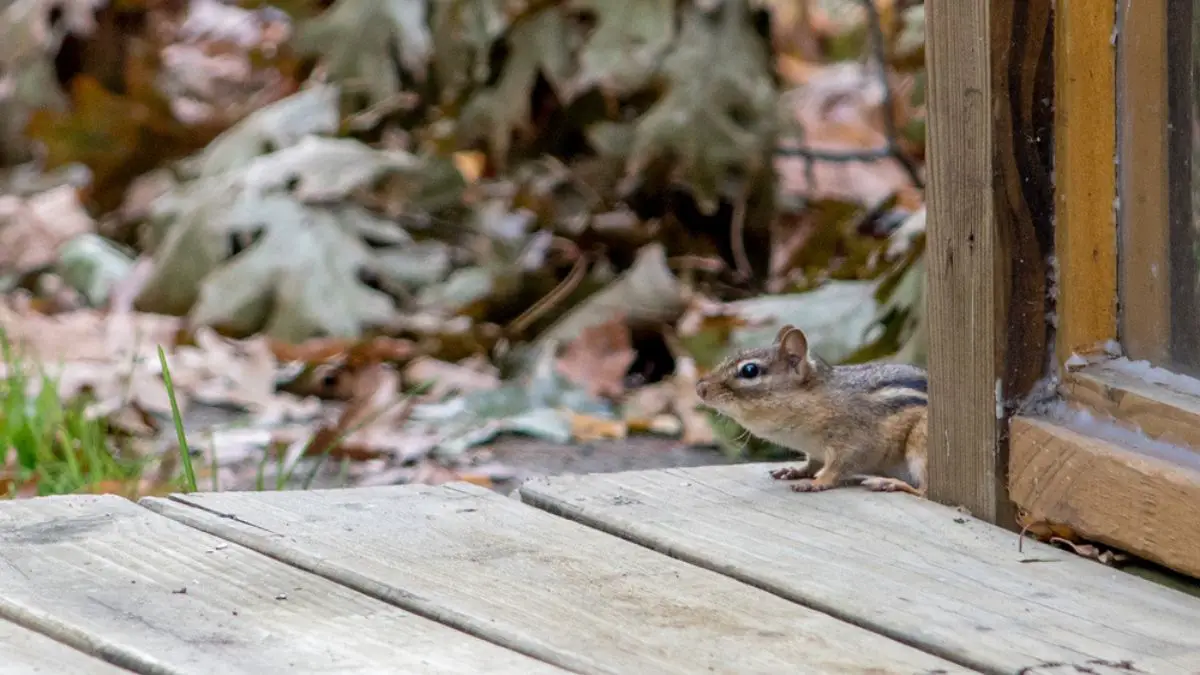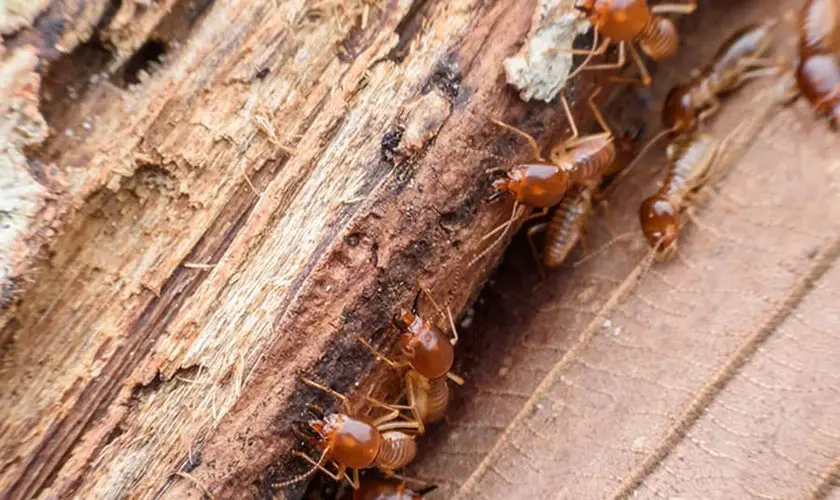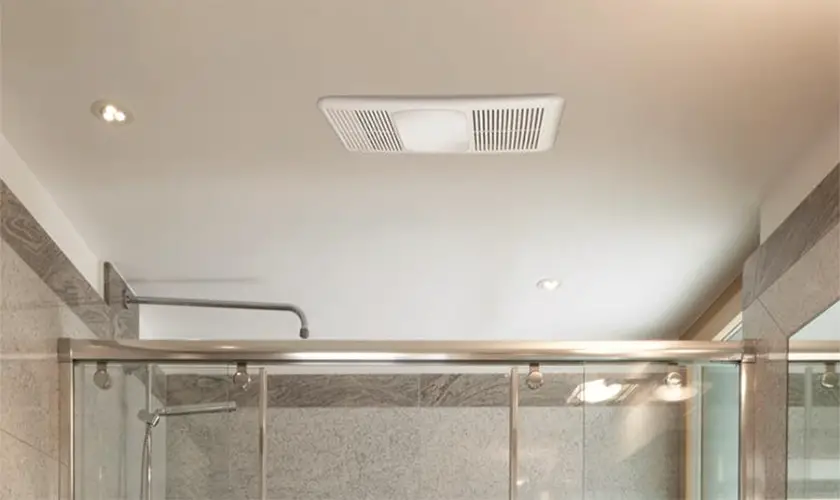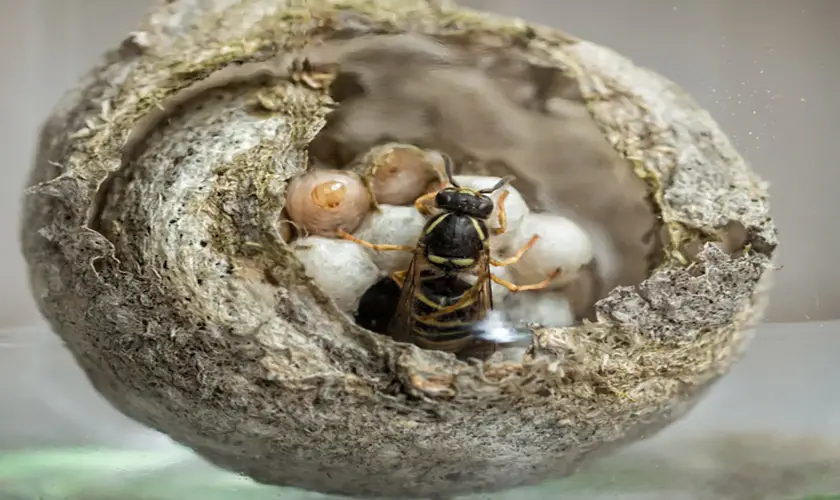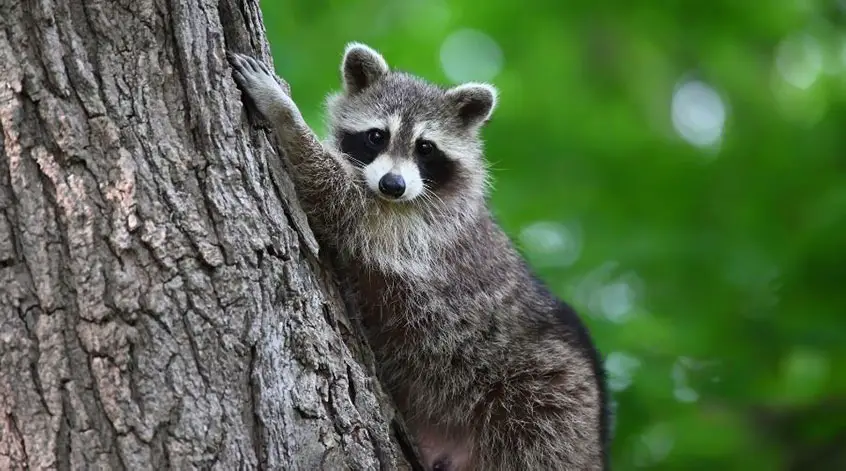
Raccoons are native to North America. Over the last few hundred years, they have been introduced to other parts of the world, including Germany and Russia. The people living in countries with raccoons are cute creatures with a rascal look attributable to their clever hands and masks. However, people living in areas where raccoons can be found are nothing but pests, just like rats and mice.
Raccoons naturally live in wooded areas, making their homes in tree or rock cavities and feeding on insects, plants, fish, bird eggs, and even the occasional bird. Unfortunately, they have quickly adapted to a more urban-based life.
They are attracted to towns and cities by the convenience of easy food, water, and shelter in trash cans, pet food and water bowls, crawl spaces under porches, and attics. And once raccoons have found a home, they don’t leave alone.
There are 4 main methods by which you can get raccoons out of the attic. These are persistent pests, so you should employ a multi-method approach:
- Remove food and water attractions
- Repel the raccoons
- Scare the raccoons
- Call in a professional raccoon exterminator
Raccoons are quite a persistent problem, and their feces contain parasites that can be transmitted to you or your pets. Unlike many other pest-control issues, this one is least likely to be solved without calling in the professionals, although there are some things that you can try.
Get FREE quotes from licensed pest control technicians in your area today. Whether you need spraying for ants, roaches, spiders, ticks, mosquitos, or bed bugs, We Can Help! All technicians are screened, licensed, and insured.
Signs That You Have Raccoons In The Attic
- Disturbed trash cans and sightings: If you frequently find your trash cans upturned or rifled through, you have a raccoon problem. They might not live in your attic, but you should take this as a reason to check for holes or other signs in the attic. If you actually see raccoons in your yard, the chances are that they live in your attic. If you see them in your attic, they are certainly not just there for a visit; they have moved in.
- Urine and feces: If you find patches of urine or droppings in the attic (accompanied by a smell), you may have a raccoon problem. You can carefully collect a few droppings (use gloves) and take them to a pest control specialist to confirm if it is raccoon droppings. This will be a good sign that raccoons have been living in your attic for a while. If you find dropping in your swimming pool, this is also likely to be raccoons. They do this so that the water can mask their scent from predators.
- Pattering footsteps and banging in the attic at night: If you hear sounds coming from the attic at night, this can indicate raccoons. However, it may also be caused by other pests like rats and mice. Listen for how heavy the footsteps sound; raccoons are much bigger than rats and mice.
- Chirping sounds from the attic: Raccoons make a range of chirping and cat-like sounds. If you start to hear these sounds at night, you probably have raccoons in the attic.
- electrical issues: Raccoons will chew on your electrical wiring, so you might notice your lights start to flicker or electrical outlets suddenly become faulty. If you suspect raccoons have damaged your electrics or have found damaged wires in the attic, you need to hire an electrician because this damage is a fire hazard.
- Damaged pipes and insulation in the attic: Raccoons are very destructive so they will leave their mark on the pipes, ducts, and insulation in your attic. If you store boxes and furniture in the attic, these will also likely be damaged.
- Damp and leaks: If damp patches start appearing on your ceiling boards, or you start to have leaks in your roof, this can indicate raccoons. They will make or enlarge holes in your roof, interfering with the weatherproofing.
- Claw marks or holes in fascia: Raccoons are strong and can claw their way into your attic through the fascia boards.
- Bird feeders: If you keep bird feeders, and you start to notice that they need to be topped up more often or pulled down completely, this could be raccoons.
- Newspaper test: You can employ the newspaper test to confirm that raccoons are in the attic. Wad up some newspaper in any hole you think is an entrance for the raccoons. If the newspaper is disturbed after a few days, raccoons have likely pulled it out to get through.
The newspaper test can also test if your efforts have successfully rid your attic of raccoons.
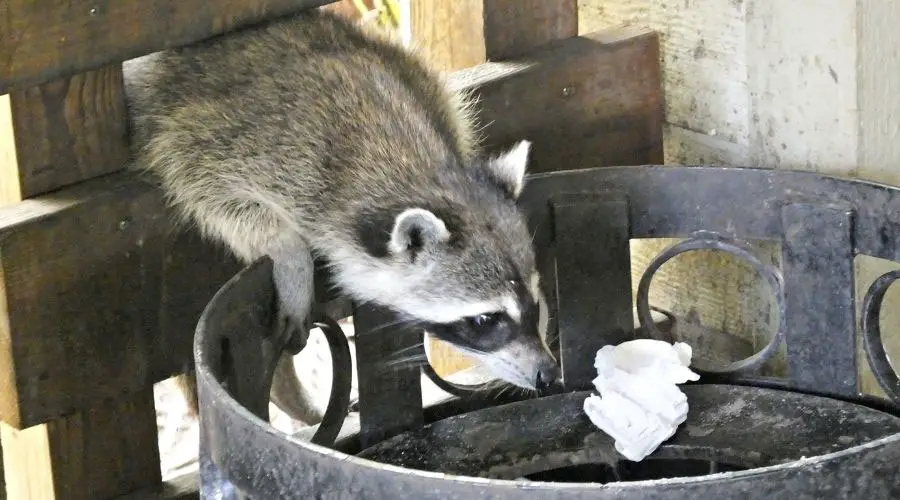
1. Remove Attractions So Raccoons Will Be Less Tempted To Stay Or Return
Many people associate raccoons with night-time raids on trash cans, but raccoons are attracted to all sorts of things that your yard provides.
Food Sources Are Attractions For Raccoons
Trash Cans
Trash cans are, of course, a big attraction to raccoons. As omnivores, raccoons will be happy with discarded fruits, vegetables, and meats and dig through your trash to get them.
- Removing Temptation: It would be best if you sealed your trash cans tightly. There are several options that you can purchase which have been designed to keep pests out. Some are even designed to keep bears out! Now those would work for a raccoon.
You should also dump and clean your trash cans regularly. Rotting food produces a more pungent smell, so getting rid of it before it begins to rot will help to minimize the attraction. Regular cleaning will also reduce the smell, and the smell of the cleaning products can mask the smell of food.
Bird Feeders
Raccoons will eat anything. A continuously filled bird feeder is always an option for these scavengers. They not only eat the seed from the feeders but will root around in the lawn beneath for dropped seeds.
- Removing Temptation: You will need to remove your bird feeders for a while. You could hang them high up and on tree branches that are too flimsy to support a raccoon, but as mentioned, they are still attracted to the dropped seed. If you are diligent about cleaning up the dropped seed, you can leave the bird feeder up, but it might be worth taking it down for a few months. You can put them back up when the raccoons are gone.
Pet Food
Bowls of pet food are a big attraction to raccoons. They will eat both wet and dry food. Another issue with this is that raccoons carry diseases; if they share food bowls with your pet, they could transmit diseases to your pet.
- Removing Temptation: Pick up your pet food bowls once they are empty. If you like to leave food out for your pet, then only leave it out during the day when raccoons are not active.
Untidy Yards
Raccoons will eat the grubs and insects that breed in piles of vegetation and rotting leaves. They will also eat nuts, berries, and other fruit that have fallen from bushes and trees.
- Removing Temptation: Keep your yard clean and tidy. Rake up loose leaves and vegetation and burn them or securely compost them (in a closed composting container). Pick up any fallen fruits from the ground daily. This also applies to nuts (a big job!).
Goldfish and Chickens
Raccoons will view your goldfish ponds and chicken coops as sources of food. They will eat the fish, eggs, and even the chickens themselves.
- Removing Temptation: Cover your goldfish ponds with strong wire mesh that the raccoons will not be able to break, and make sure the openings are too small for their clever little hands to reach through. Fortify your chicken coop and lock them in a secured chicken house at night. Keep the coop clean as well, clearing away uneaten food each day.
Water Sources Are Attractions For Raccoons
Raccoons need water to survive. If your property provides food and water, they will make themselves a shelter in your attic, having all their needs met in one place.
Pet Water Bowls
Bowls of water you put out for your pet will benefit your pesky attic squatters. This also presents the issue of disease transmission.
- Removing Temptation: This is tricky to resolve because your pets should always have access to water. If your pets are allowed inside, move the bowl inside.
Birdbaths
Unfortunately, getting rid of raccoons is going to impede your bird watching. Not only do you need to get rid of the bird feeders, but you also need to keep birdbaths empty as raccoons will view these as a reliable water source.
- Removing Temptation: Keep bird baths empty.
Puddles
Pools of standing water caused by overwatering your yard or poor drainage will also attract raccoons to your yard.
- Removing Temptation: Fix any areas of poor drainage in your yard and take care not to overwater.

2. Repel The Raccoons
Use Ammonia Or Apple Cider Vinegar
Raccoons hate the acrid smell of ammonia and apple cider vinegar. In the attic, you can put bowls of these liquids or rags soaked in ammonia or vinegar. If you use ammonia, ensure you don’t put it near vents that supply your house; inhaling ammonia is not recommended for humans and pets. Your pets should also not be able to access ammonia. Apple cider vinegar is the safer option for this method.
Use Peppers, Onions, and Spices
The smell of hot peppers and onions is repellent to raccoons. You can boil peppers and onions in water for a couple of hours. Then collect the water and use it as a spray around the attic, especially at the entrances.
Raccoons also don’t like the smell of black pepper, cayenne pepper, and cinnamon so you can sprinkle these around the attic and entrances to the attic. You can also sprinkle them over your yard if you have a smaller yard.
You will need to re-spray or re-scatter regularly, especially after rain. This is not the most effective method of repelling raccoons, but it can’t hurt to try, especially in conjunction with another method.

3. Scare The Raccoons Away
Raccoon Eviction Fluid And Other Predator Scents
Raccoon eviction fluid is reportedly 75% effective. Place the fluid at the main entrance the raccoons use to enter the attic and seal all other entrances. This fluid contains the scent of a boar male raccoon known to kill the kits to ensure that he remains the dominant raccoon in the area. Mothers should remove their babies within a few days. Use the newspaper test to ensure they have left and seal the main entrance.
You can also purchase other predator scents around the yard and attic, which should have a similar effect.
Big Dogs And Animal Fur
Raccoons are 11-57 lbs and 16-28″ in length. A Jack Russel Terrier or a cat will not be a suitable deterrent to the raccoons and may even be in danger of being hurt, so you should keep them inside at night. Big dogs can hold their own against a raccoon, and their barking and scent might be enough to scare the raccoons out.
You can also try scattering animal fur around the attic and yard.
Motion Sensor Lights And Sounds
Some people use radios and motion sensor lights in the attic or at the entrances. The intention is to make raccoons think that the attic is occupied by humans and is no longer a safe place to live. The effectiveness of these “humane harassment” methods is limited and can also wear out as the raccoons become accustomed to the lights and noise. Additionally, the motion sensor lights can be activated by other things and become annoying.
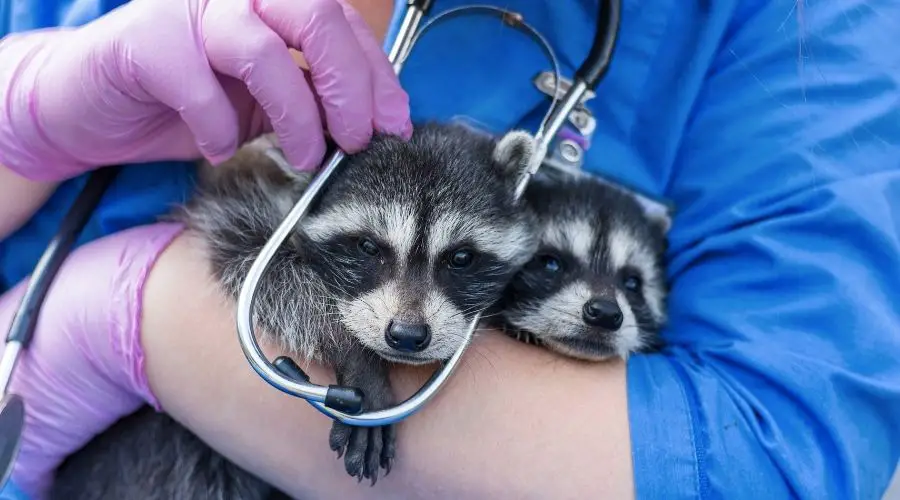
4. Call In The Professionals
The effectiveness of home methods for getting rid of raccoons can be limited, especially if mother raccoons have their kits in your attic (their instinct to protect these kits is strong).
It is important to ensure that you don’t accidentally separate a mother from her kits or seal a raccoon into the attic. Some professional raccoon-removers also offer clean-up services as part of the fee. If none of the home methods are working, hire a professional.
Why Trapping Is Not A Good Idea Unless You Get A Professional To Do It
It is not a good idea to trap and release raccoons. You may trap a mother whose kits will die without her. These kits could end up being in your attic; if they die, it can take a while to find them.
Raccoons often don’t survive when released into unknown territories. They may also be hit by cars while trying to make their way back to their known areas or find their kits.
Some states have laws about catching and relocating wildlife. So, if you want to or need to use trapping, get a professional to help you as they know the laws and should do it humanely, checking for kits in the attic and releasing the raccoons close enough to all of them to find their kits if they are outside.
Conclusion
While raccoons are quite cute for pests, they are pests nonetheless. They cause damage to houses and can bring parasites and bacteria into your household, putting you and your pets at risk.
Whether you are going to try and use DIY methods or get rid of raccoons, or you are going to call in the professionals, you need to make sure that your yard is free from the attractions that brought the raccoons to your house and kept them there. This will prevent other raccoons from moving in or the old tenants from returning.
It would help if you considered hiring a professional to handle this pest problem as the home methods have limited effectiveness. Once you have successfully evicted these masked squatters, seal off all the entrances with hardy materials and regularly check to ensure the raccoons aren’t trying to make new holes.
You should also thoroughly clean the attic to remove the smells (which are offensive and may attract raccoons back) and any parasites or bacteria that the raccoons brought in.
Get FREE quotes from licensed pest control technicians in your area today. Whether you need spraying for ants, roaches, spiders, ticks, mosquitos, or bed bugs, We Can Help! All technicians are screened, licensed, and insured.


